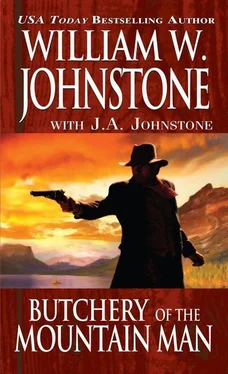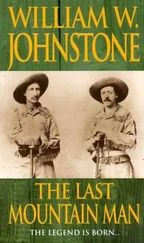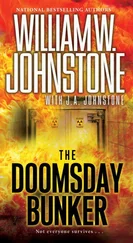By the time the first snows came, they were warm and snug in their house, and Claire announced that she was pregnant.
“Wow! Then we have to celebrate!” John said. “You know what? I think it must be nearly Thanksgiving. Yes, I’m sure it is. I’m going to kill us a turkey, and we’ll have an old-fashioned Thanksgiving Day dinner, just the two of us.”
John did kill a turkey and the aroma of it cooking filled the inside of the little cabin so that by the time it was ready to eat, they were both ravenous. John smiled as he carved up the turkey for them.
“Happy Thanksgiving,” he said.
“What is Thanksgiving?”
“You’ve never heard of Thanksgiving?”
“No.”
“Well, then I’ll tell you the story.”
For the rest of the afternoon John told the story of the Pilgrims, and their voyage to America on the small ship, the Mayflower . He told of the men and women who left England in search of religious freedom.
“They thought they were going to the Virginia Colony, where some Europeans had already settled, but in November, they reached Cape Cod, Massachusetts.
“There were a hundred and two passengers on the ship,” John said. “And the ship remained at anchor while they built cabins where they could live.”
“Like this,” Claire said, taking in their cabin with a proud smile.
“That first winter was brutal, and more than one-half of them died the first year, from starvation and disease. The Pilgrims held secret burials for the ones who died, so that the Indians wouldn’t realize how few were remaining.”
“Indians?” Claire asked. She pointed to herself.
“These were Wampanoag Indians. And they eventually began helping the Pilgrims, because if they hadn’t, I believe every one of them would have died. And think how that would have changed history.”
“And they ate turkey?” Claire asked, not making the connection between the Pilgrims, half of whom had died, and the turkey they were eating now.
“Yes. You see, after almost dying of starvation, they had a good harvest, and to celebrate the harvest, and the fact that at least half of them were still alive, they held a feast. And the Indians came to join them,” John said. He smiled, and made a motion with his hand to take in the two of them.
“It’s like us,” he added. “Indian and white man coming together to give thanks.”
“The baby will be a Thanksgiving thing,” Claire said. “The baby will be Indian and white,” she added, touching John on the face, then putting her hand on her stomach.
“Yes, it will indeed be a thing for thanksgiving,” John said.
John ran his traps every day that winter, beaver traps in the water, and marten traps hanging from trees near the water. The reason the marten traps had to be hung from trees was to prevent rodents from chewing on the martens once they had been caught.
The trapping was bountiful, much more even than he and Smoke had brought in the year before. He would skin the beaver, and hang the meat out so the wild animals couldn’t get to it. Claire would scrape and clean the hides, then stack them. She also cooked the beaver meat, sometimes frying it, sometimes baking it, sometimes grilling it over the open flames of the fireplace. She also boiled the beaver and made a soup, cooked with wild onions, mushrooms, cattail, and sun root tubers.
John kept a close count of his furs and before winter was half over, had over a thousand dollars’ worth of pelts, based on the prices they paid the previous year. But he had also heard that the St. Louis market paid twice as much, and at that rate it would be worth his while to go there.
CHAPTER TWENTY
Boulder
“The team in red is the University of Denver,” Professor Armbruster said. “So far this season, we haven’t lost a game. As a matter of fact, nobody has even scored on us this year and . . . oh, oh, this isn’t good.”
On the field one of the players wearing red broke free from the rest and started a long run, with players wearing black chasing after him. There were loud cheers from the other side of the field, and groans from this side. “I spoke too soon,” Professor Armbruster said.
“Why?” Sally asked.
“Denver just made a touchdown.”
Despite Denver’s score, Colorado won the game, twenty-one to seven, and there was much celebration on the campus that evening.
Smoke and Sally had been invited by Professor Armbruster to dine with him and his wife, as well as Dr. and Mrs. George Norlin. Dr. Norlin was president of the University of Colorado.
“I have been listening to recordings of your account each evening,” Dr. Norlin said. “And I must say that I am finding the story very fascinating. You will truly go down in history as one of our most valiant men.”
“You are embarrassing me, Dr. Norlin,” Smoke said with a smile. “I just spent most of my life trying to stay alive.”
“Dr. Norlin won’t say anything about it, but he has been in a fight as well, with the state legislature,” Professor Armbruster said. “They have been taken over by the KKK, and they are demanding that he fire every Catholic and Jew on the campus. And to his credit, he has refused to do so.”
“Good for you, Doctor,” Smoke said.
“It has been at some cost, I must say,” Dr. Norlin said. “The state has stopped all financial aid to the university. We are having to subsist on what income we can garner from tuitions, and such revenue-producing programs that we have, such as our football team.”
“Sally, give me the . . .” Smoke started to say, but Sally had already gotten the checkbook from her purse and was handing it to him, with a smile.
“Would ten thousand dollars help?” Smoke asked, as he started writing the check.
“What? Why, yes, of course. But please, Mr. Jensen, I hope you don’t think this was a request for a donation.”
“It doesn’t matter whether it was a request or not,” Smoke said. “It’s something I want to do.”
“I’m serious,” Wes said over Monday morning breakfast at the TKE house. He was talking to Philip McGrath, the Grand Prytanis of Tau Kappa Epsilon. “You come up with any name in the history of the American West, and this guy knew them. Wild Bill Hickok, Falcon MacCallister, Buffalo Bill, Monte Carson, Calamity Jane, Wyatt Earp, Doc Holliday. He knew them all! Not only that, he’s lived the kind of life that you read about in novels. You need to meet him just so that someday, fifty or sixty years from now, you can tell your grandchildren that you met Smoke Jensen.”
“I heard about what he did at the speakeasy, an old man like that,” McGrath said.
“I tell you what, Phil. It might be that he’s been around for a long time, but I wouldn’t exactly call him an old man,” Wes said. “No, sir, not by a long shot. And certainly, not to his face,” he added with a laugh.
“I remember reading books about him when I was a kid,” Phil said. “But they were all novels. I didn’t know there really was such a person.”
“When Professor Armbruster asked me if I would make the recordings, I tried to get out of it,” Wes said. “I mean, who wants to sit around and listen to some old man mumble on with his stories. But I wouldn’t trade what I’m doing for the world. Sixty, seventy years from now, if I’m still alive, I’m going to tell everyone I know that I met Smoke Jensen. Why . . . it’s like meeting Abraham Lincoln, or Davy Crockett, or Andrew Jackson. I mean, you name someone from our history . . . anyone, and I wouldn’t get any bigger a thrill meeting them than I have gotten by meeting Smoke Jensen.”
“I can tell he’s made quite an impression on you.”
“Yes, he has,” Wes admitted. “I’m telling you, Phil, you need to meet this man.”
Читать дальше












